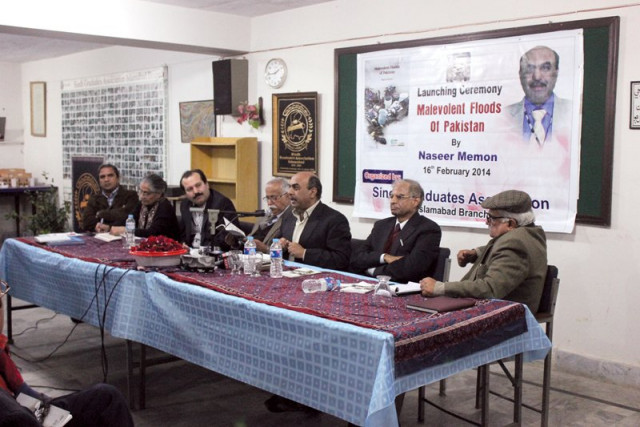Book launch: Floods in the country a governance disaster, says writer
Speakers call for promotion of people-friendly policymaking approach.

Author elaborates on themes in the book at the event. PHOTO: EXPRESS
“It is my considered view that these floods were a governance disaster,” said Naseer Memon, a writer and development-sector professional. “More than a natural or administrative issue, they are a political issue and must be viewed through the political lens.”

Memon was speaking at the launching ceremony of his new book “Malevolent Floods of Pakistan,” in which he has discusses the context and impact of recent floods and makes suggestions for flood management. The ceremony was organised by the Sindh Graduates Association on Sunday.
Memon said that he wrote the book to consolidate the key issues surrounding floods that have affected millions of people in Pakistan since 2010. The country has witnessed an increase in extreme weather events that the scientific community has attributed to changing climatic conditions.
He said that the floods used to be benevolent for rural communities once. But they have turned malevolent because of several factors including encroachments in floodplains, deforestation, usurping of natural waterways and lack of land planning, for which the political and ruling elites were responsible.
“The root causes are needed to be addressed, otherwise, the threat of climate change will emerge as the biggest danger to Pakistan in the future,” Memon said.
The book talks about floods from different perspectives including climate change, effect on households, role of philanthropy, health impact, gender and food security.
Panellists who spoke about the book said despite being just around 60 pages, the book was a contribution to reference literature on recent floods and gives a comprehensive representation of what went wrong during the floods from 2010-12.
Senior climate change expert Qamaruz Zaman Chaudhry said that Pakistan has exemplary early flood warning systems but if governance failures and lack of appropriate actions based on the warnings render the systems useless.
He said that building more dams might not completely prevent floods from happening, but the dams can help “scatter the peak flow of water during the floods” to manage the floods and limit the scale of destruction.
Chaudhry’s argument was supported by Idrees Mehsud, a director at the National Disaster Management Authority (NDMA), who said dams can help delay the water peaks.
Mehsud said that the monsoon pattern in Pakistan was shifting westward to the mainland and more rainfall might be expected outside the catchment areas of Mangla dam.
“We have to develop infrastructure and also prepare the communities that might be affected by the monsoon shift,” he said.
NDMA is often criticised, Mehsud said, but he mentioned the government has adopted a national disaster risk reduction policy which comes with action plans including the National Disaster Management plan.
Under this specific plan, the NDMA has planned 118 interventions over the next 10 years with a $566 million worth of projects for flood protection, he said. These include $166 million for early warning systems at 32 sites that have been identified as vulnerable to flash floods.
Activist Tahira Abdullah said that the book was easy-to-read and full of data and information. Even though Abdullah disagreed with mentioning women issues in a separate chapter, she said the book did not ignore the way women and girls were affected by natural disasters.
She said those government officials, politicians and feudal lords who were complicit in blowing up levies to divert flood water away from their lands, causing the water to wreak havoc on other areas, should be named and shamed and punished.
Aimal Khattak said that the best thing about the book was that it steps away from traditional isolated approaches of discussing a particular natural disaster and takes a broader view of the problems surrounding disaster risk reduction and management.
Audience members also brought attention to issues such as food insecurity, flash floods and the state institution’s failure to provide relief to people. They also called for a need to promote pro-people approach in policymaking and policy implementation.
Published in The Express Tribune, February 17th, 2014.



















COMMENTS
Comments are moderated and generally will be posted if they are on-topic and not abusive.
For more information, please see our Comments FAQ